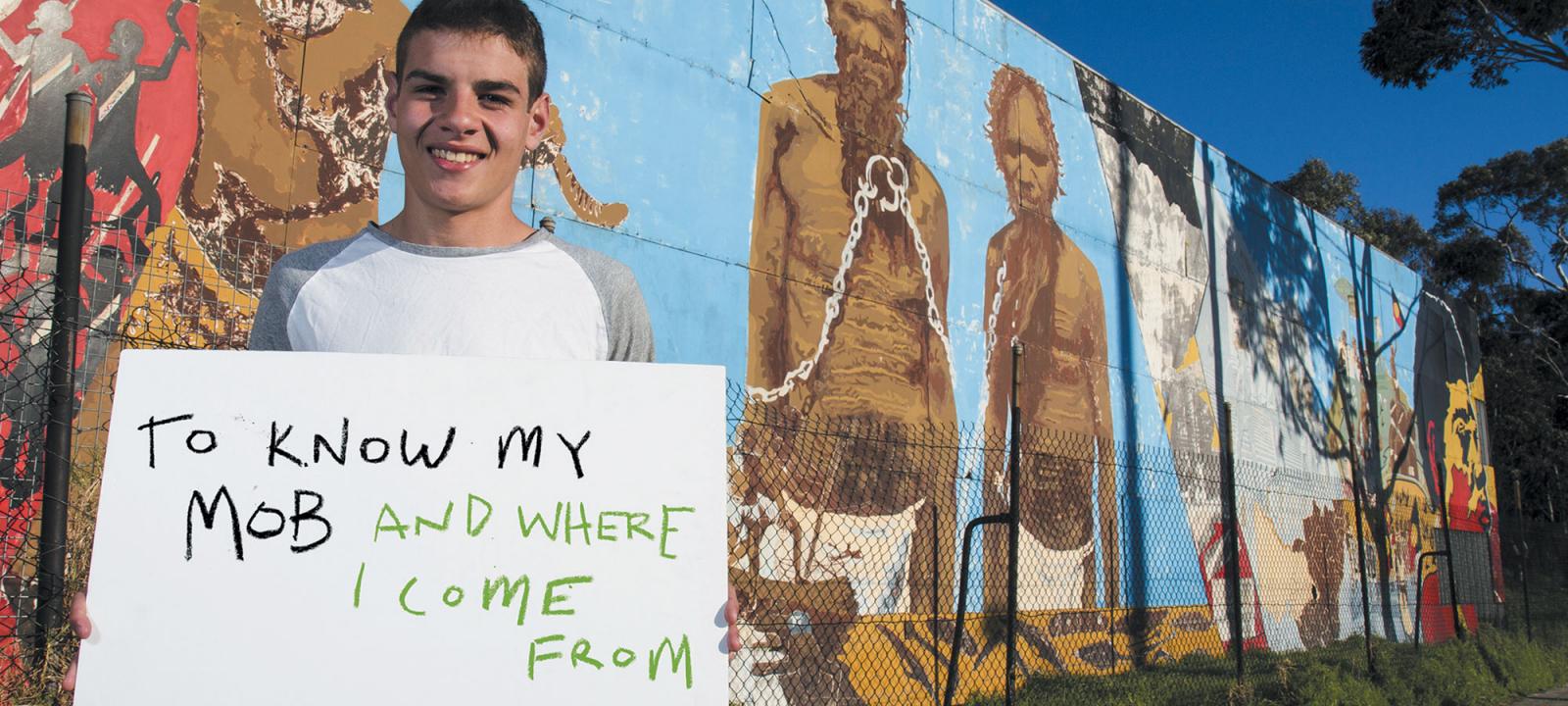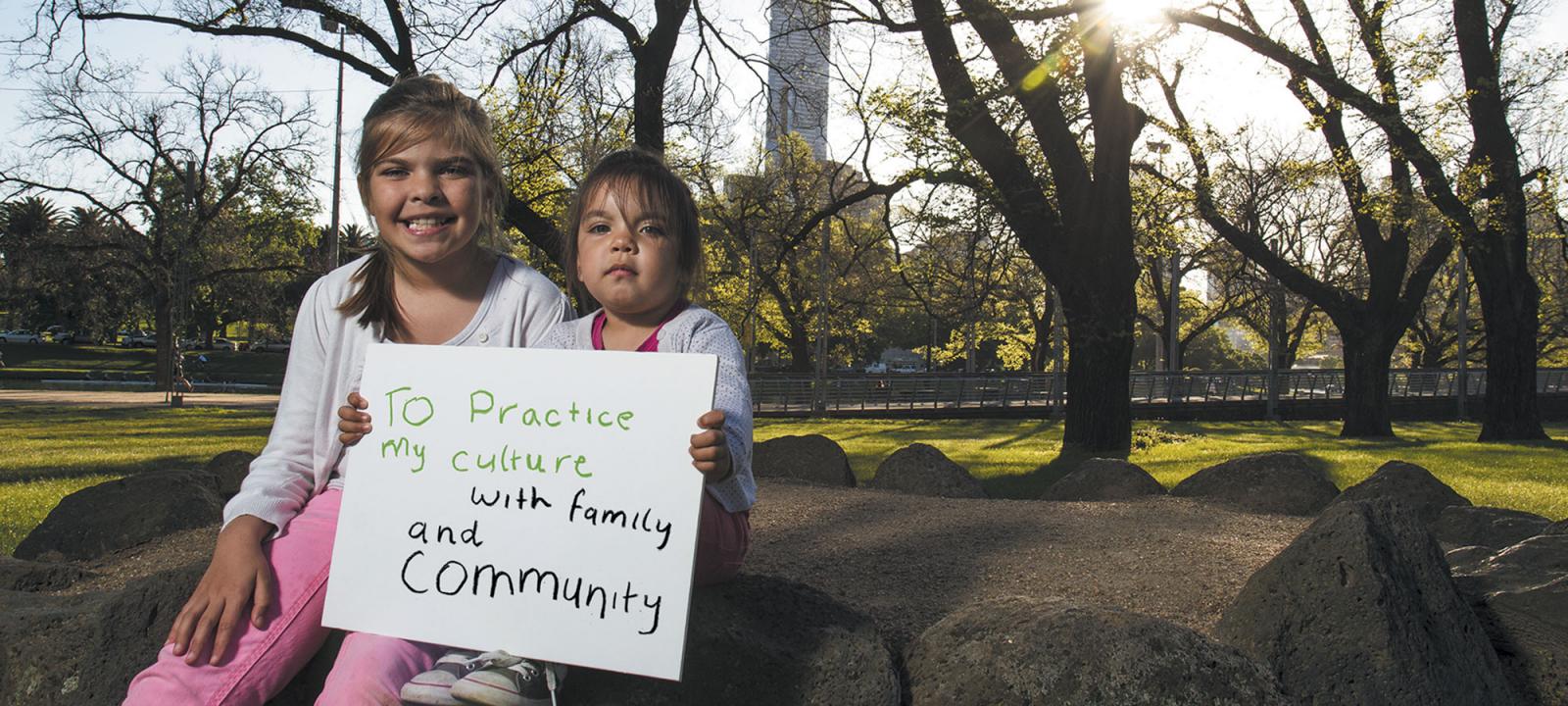Self-determination is about Aboriginal and Torres Strait Islander people having control over our lives and Communities. A treaty is an agreement between two groups about sharing land and resources. Aboriginal and Torres Strait Islander people have been fighting for treaty as an important way of achieving self-determination.
Aboriginal and Torres Strait Islander people have been living on what is now called Australia for thousands and thousands of years. We come from over 250 different language groups and have strong roots in our culture, lore and Country. Europeans came to Australia in 1788. Throughout the experience of colonisation, Aboriginal and Torres Strait Islander people have fiercely fought for rights, Country and culture. This article will look at some important ideas and concepts for Aboriginal and Torres Strait Islander resistance, survival, politics and identity today - self-determination and treaty.
What is self-determination?
Self-determination is the ability to have power and control over your own affairs and your own life. For Aboriginal and Torres Strait Islander people, this means being able to make decisions that affect Community and being able to practice culture. Self-determination is about being empowered and having freedom and dignity. It also involves recognising and respecting Aboriginal and Torres Strait Islander people as First Nations with our own decision-making and knowledge systems. Self-determination for Indigenous people is a human right recognised by the United Nations.
Self-determination can mean different things to different people. In some areas there has been progress towards self-determination but there is still much work to do. Some examples of self-determination that people have fought for in the past and are continuing to fight for today include:
- Being able to make decisions according to Aboriginal and Torres Strait Islander culture, such as respecting the wisdom of Elders and allowing an open dialogue or a yarn to reach a decision.
- Returning land to Aboriginal and Torres Strait Islander people and having rights and powers to protect Country.
- Having Aboriginal Community Controlled health, legal, education, children's and other organisations providing services to the Aboriginal Community.
- Being able to make political decisions that affect the Community and govern ourselves. Examples are having specific seats in Parliament (which happens for Māori in Aotearoa/New Zealand) or having a separate Aboriginal decision-making body or government.
- Requiring governments to design new laws or policies in an equal partnership with Aboriginal people.
- Having culture recognised and respected and being able to practice culture in everyday life.
Self-determination is not just about high up or government decisions. It's also about people and Communities being able to control their own lives and practice culture. Children and young people also have the right to self-determination so they can be strong in their identity, be connected to culture and Community and have their voice heard.
"Self-determination is about having appropriate Aboriginal governance structures that allow individuals to make real choices and decisions that affect their own life. For children it’s about knowing who you are, what you want and how to go about getting it" – Aunty Muriel Bamblett, VACCA CEO.


The following is an example of self-determination for a young Aboriginal person: Jack is a Yorta Yorta and Dja Dja Wurrung boy. He lives with his Aunty, Uncle and sister in Melbourne. Jack has always felt a connection with his Aboriginality but has found it hard to speak with some of his family members about his cultural ties, as some of his relatives were members of the Stolen Generations and find it hard to talk about their past. In Jack's Cultural Support Plan he has expressed that he wants to learn more about his family, language and Country and is being supported to connect with Community and learn about his mob. When he gets older and feels ready, he would like to return to Country. Through this process, Jack is being supported to know who he is and be strong in his identity.


Aboriginal people will continue to fight for self-determination and treaty in many different ways. It is important that Aboriginal people drive any treaty process and have our voices respected.
What is a treaty?
One way that Aboriginal and Torres Strait Islander people have been fighting for self-determination is through treaty. A treaty is a binding agreement that is negotiated between different groups or parties, for example Aboriginal and Torres Strait Islander people and the Australian Government. A treaty is created to show that each group has reached an agreement about duties and responsibilities around sharing land and resources and governing together. Unlike the USA, Canada or New Zealand, there has never been a treaty in Australia. Read more about treaties in other countries.
A treaty can include many different things. It might:
- Recognise Aboriginal and Torres Strait Islander self-determination and sovereignty.
- Guarantee self-determination and land rights for Aboriginal people.
- Acknowledge the harm and pain caused by colonisation.
- Offer reparations or redress for harm to Aboriginal people and Communities.
A treaty could take a number of different forms: there could be one for each mob or one at a state or national level; it could be with the national Government or with states or territories. Aboriginal and Torres Strait Islander people have been fighting for a treaty for decades.
What is happening today?
Recently there have been lots of debates and discussions about treaty and self-determination. Some of the important recent developments are:
The 2017 Uluru Statement: In May 2017, Aboriginal and Torres Strait Islander leaders from across Australia gathered at Uluru to consider and discuss the issue of recognising Aboriginal and Torres Strait Islander people in the Australian Constitution. A statement released after the meeting stated the majority of delegates didn’t agree with having only symbolic recognition in the Constitution and called for a representative body for Aboriginal and Torres Strait Islander peoples to be created and a treaty process to begin, however the Turnbull and then Morrison governments have stated they will not accept the recommendations of Uluru Statement.
Victorian treaty process: At the moment there is a treaty process happening in Victoria between the State Government and Aboriginal people. This process started in 2016 with the creation of the Aboriginal Treaty Working Group and Community consultations.
In 2018, the Victorian Treaty Advancement Commission was created and Aunty Jill Gallagher was appointed as the Treaty Commissioner. The role of the Commission is to set up the Aboriginal Representative Body. The Commission has been conducting Community consultations in 2018 and 2019 about what the Body will look like.
The Aboriginal Representative Body will be made up of elected representatives of the Victorian Aboriginal Community, including Traditional Owners and Elders and voted by Aboriginal people living in Victoria. This Body will not negotiate Treaty, but will rather set out the rules and framework for treaty negotiations. For more information about the current proposals for the Representative Body, visit the Victorian Treaty Advancement Commission website.
Mob in Victoria have been fighting for a Treaty for many years and it is important that we get it right. This Treaty will have a big impact on our Community, on our sovereignty and on our relationship with the Victorian Government. It is important that you understand the process and how it may affect you and your mob.
Something to keep in mind is firstly that it is important to understand that the Treaty process is still in its early stages and discussions are still continuing with Community about how to ensure it represents all Mobs of Victoria accurately and respectfully.
Secondly, research is key. Talk to other Community members, Elders and friends to learn more about the Treaty process and what it is on track to look like. If you have questions or concerns raise them – you are a part of Community and your voice counts.
Lastly, it is ok to raise your views. The Treaty should reflect our values and traditions and respect our Mobs, our rights and our sovereignty as Aboriginal people. If we see issues we need to be able to bring it up and discuss solutions – it needs to honour us, our history and our future.
To hear an important Community discussion about Treaty, you can watch the live stream of the Treaty Statewide Gathering that took place at the MCG on Tuesday 25th September, 2018 here.
Further reading: Self-Determination - A Youth's Perspective
Further reading: UN backs Uluru Statement From The Heart (ABC)
